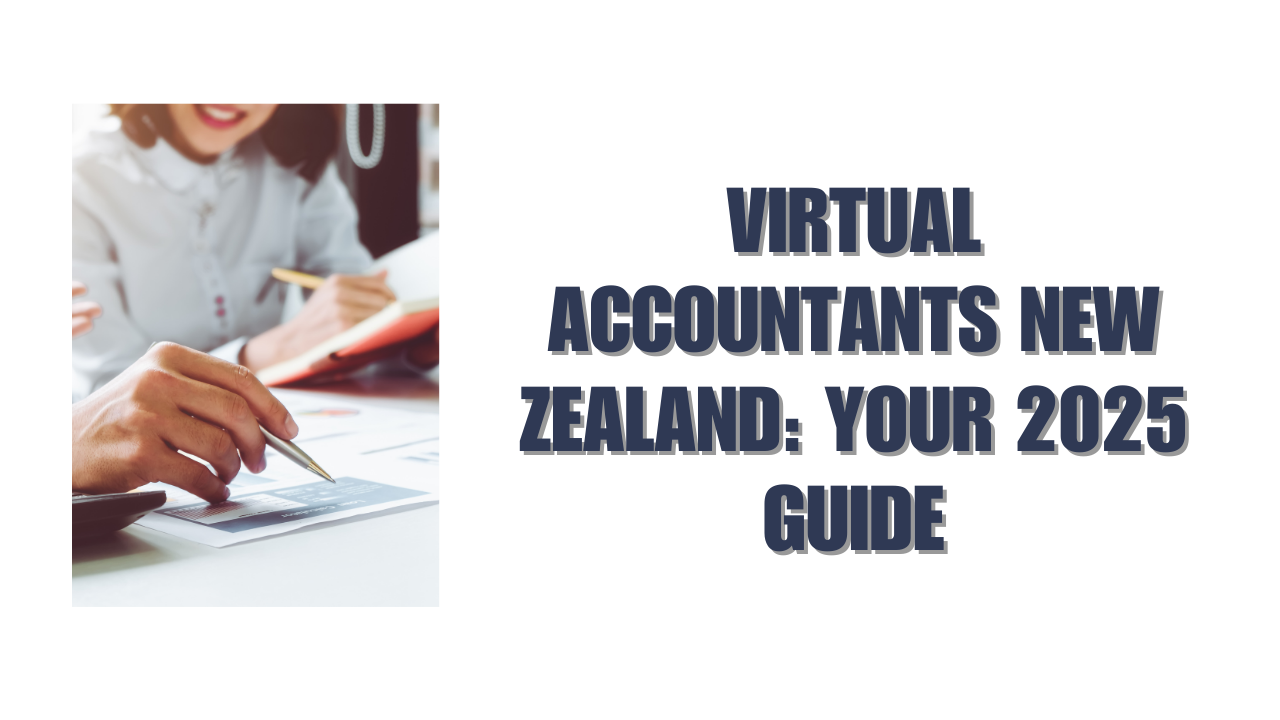New Zealand’s financial fraud cases have surged alarmingly from 288,000 to 510,000 within a year. This spike has forced businesses to reevaluate their accounting practices. The numbers reveal a startling fact – 87% of employees who committed fraud had spotless employment records and no prior offenses. Many companies now rely on virtual accountants in New Zealand to strengthen their financial security and accuracy.
Virtual accountants deliver more than simple bookkeeping services with their advanced fraud detection algorithms and systematic compliance checks. Virtual CFO NZ services and virtual bookkeeping solutions now reshape the scene of traditional accounting. They use automated security measures and immediate monitoring systems. This piece will guide you through preparing for the 2025 tax season while maintaining secure and compliant financial records.
What virtual accountants do and why they matter in NZ
New Zealand’s accounting services can’t keep up with client needs right now. This gap creates perfect conditions for virtual accountants to succeed. Virtual accountants help their clients remotely through online accounting software and video call meetings. Their modern approach lets them serve businesses throughout New Zealand and even globally without location limits.
Virtual accountants deliver these services:
- Preparing tax returns and GST filings
- Managing payroll and coding bank transactions
- Creating monthly management accounts and financial statements
- Developing budgets and cash flow forecasts
- Offering advisory services and business guidance
Virtual accountants’ value comes from their budget-friendly approach. They don’t need expensive office space, which substantially reduces overhead costs. These savings help clients get more affordable service packages.
Easy access stands out as another big plus. Cloud accounting gives business owners and their accountants up-to-the-minute access to financial data from any internet-connected device. So you can check cash flow, track expenses, and review financial reports instantly to make quick, informed decisions.
Small businesses can get executive-level financial expertise through a virtual CFO setup without paying a traditional CFO’s high fixed salary. Companies just need to pay for services they use while getting expert guidance on budgeting, strategy, funding, and governance.
Virtual accounting’s shared nature makes it special. Multiple users can work with financial information at the same time, so everyone stays in sync on financial matters. Most virtual accounting firms also employ qualified chartered accountants who maintain high professional standards. This gives clients confidence in their service quality.
Tech-savvy businesses in New Zealand increasingly choose virtual accounting solutions. These expandable solutions offer flexibility as your business grows – from occasional consulting to regular ongoing support. Virtual accountants help guide you through today’s complex business world without traditional limits.
How to prepare for tax season with a virtual accountant
Tax season preparation should start well before filing deadlines. A good virtual accountant and proper organization can turn this stressful period into a smooth process.
Start a dedicated tax account early in the financial year. Put a portion of each payment into an interest-earning account for tax and ACC payments to avoid surprise bills. This approach will give a safety net when tax obligations come due.
Good record keeping serves as the foundation of tax preparation. Businesses in New Zealand must keep their records for at least 7 years. Your virtual accountants in New Zealand can help set up a reliable documentation system that has:
- All expense receipts and invoices (both received and sent)
- Records of other income types (dividends, rental income)
- Business expense payments through business accounts for clear audit trails
Cloud-based accounting software makes tax preparation easier. These platforms automatically calculate financial information, which makes GST filing and provisional tax management simpler. Your virtual accountants can access your up-to-the-minute data and provide quick fixes and explanations when needed.
Businesses close to the GST threshold of NZD 102,336.62 can get help from their virtual CFO NZ to register and set up systems that charge the required 15% GST on sales and income. So they’ll make sure you claim eligible GST on purchases and expenses.
Virtual accountants give strategic advice on tax minimization beyond basic record keeping. They help claim all available deductions and credits, assess your tax situation correctly, and handle refunds or transfers when needed.
Note that IR3 returns must be in by July 7, 2025. All the same, your virtual accountant can ask for an extension if you can’t file on time.
Data security should be your top priority in all tax preparations. Most virtual accounting services use secure client portals with advanced encryption to protect sensitive financial data from unauthorized access. This security focus matters more now with increasing cybersecurity threats to financial information.
Choosing the right virtual accountant or CFO in NZ
You need to think carefully about finding the right financial partner. Virtual accountants New Zealand should have top qualifications. Look for professionals who have chartered accountant designations and follow the NZICA Code of Ethics. These credentials show you’re working with experts who maintain high professional standards.
The cost savings are compelling. A full-time CFO costs around NZD 383,762 per year. Virtual CFO NZ services give you similar expertise at a much lower price. This makes professional financial guidance available to businesses of any size.
Many virtual accounting services go beyond just one generalist – they offer a team approach. The best providers use a “buddy system”. Another professional shadows your main contact and learns your business with them. Your work continues smoothly even when your regular accountant is away – this helps especially during busy tax periods.
Technical skills matter because your entire relationship depends on digital tools. Your provider should be skilled at accounting software like Xero, or Quickbooks. You should also ask about their computing setup to make sure they can give you reliable, uninterrupted service.
Experience in your industry can be invaluable. An accountant who knows your sector can spot common tax deductions and warn you about new regulations that affect your business. Manufacturing or commercial businesses need professionals who understand project reporting and inventory software.
The way your accountant communicates deserves attention. A good virtual accountant explains complex financial ideas in simple terms without using too much jargon. They should also respond quickly – you can’t wait days to get answers to urgent questions.
Remote work might be standard, but your virtual accountant needs to understand New Zealand’s business culture. They should also provide secure client portals with strong encryption to keep your financial data safe.
Conclusion
Virtual accountants are shaping the future of financial management in New Zealand. These professionals know how to prevent fraud, handle tax obligations, and provide expert guidance that makes them crucial partners for businesses that want to stay competitive and compliant.
The numbers speak for themselves. Businesses can save up to NZD 300,000 each year by switching to virtual accounting services instead of hiring traditional in-house teams. On top of that, better security measures and up-to-the-minute data analysis protect companies against increasing financial fraud.
Stress-free tax seasons begin with qualified professionals who understand New Zealand’s business environment. A virtual accountant or CFO delivers expertise, flexibility, and economical solutions that traditional accounting services find hard to match.
Your financial future becomes more secure with the right virtual accounting partner through proper documentation, smart tax planning, and secure digital systems. Their remote capabilities and advanced technology provide professional support whenever you need it. Tax season changes from a dreaded deadline to a manageable process.
FAQs
Q1. What are the main benefits of using virtual accountants in New Zealand?
Virtual accountants offer cost-effective, accessible, and flexible financial services. They provide real-time access to financial data, enhanced security measures, and expert guidance without the need for expensive office space or full-time salaries.
Q2. How can I prepare for the tax season with a virtual accountant?
Start by setting up a dedicated tax account early in the financial year. Maintain thorough records of all financial transactions, use cloud-based accounting software, and work closely with your virtual accountant to ensure compliance and maximize deductions.
Q3. What should I look for when choosing a virtual accountant or CFO in New Zealand?
Look for chartered accountants with industry-specific experience, strong technical proficiency in accounting software, and excellent communication skills. Ensure they offer secure client portals and understand New Zealand’s business culture.
Q4. How do virtual accountants help prevent financial fraud?
Virtual accountants use advanced fraud detection algorithms and regular compliance checks. They provide real-time monitoring of financial operations and implement secure digital systems to protect sensitive financial data.
Q5. Can virtual CFO services replace a traditional in-house CFO?
Yes, virtual CFO services can provide executive-level financial expertise without the high fixed salary of a traditional CFO. They offer scalable, flexible solutions that allow businesses to access expert guidance on budgeting, strategy, and governance as needed.






